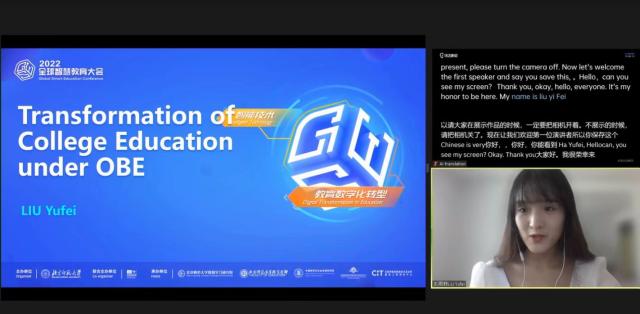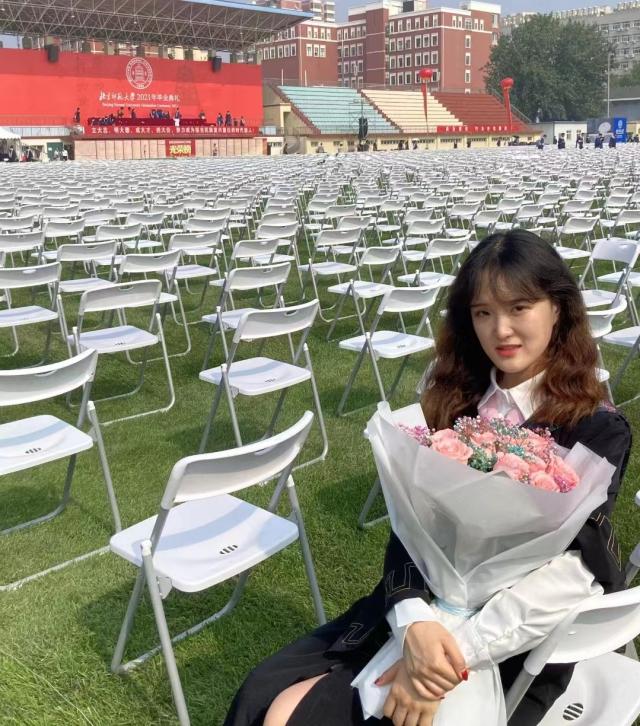
刘雨菲,北京师范大学外国语言文学学院硕士生(中国)
点击链接观看发言视频:“成果导向教育(OBE)”视角下的大学教育转型
刘雨菲认为,学生在学习中获得知识和能力与未来社会的需求不匹配,教学不能很好地支持学习者在未来的发展是突出的学习危机,这需要学校乃至整个社会共同努力加以改善。 《光明日报》指出,2019年我国大学生专业对口率仅为60%,这意味着10个大学生中有4个将进入与所学专业无关的领域。教育的目的是为社会培养各类人才,每个领域都有优秀人才。学生拥有更好的自主学习和实践技能,将有助于适应变化的世界,拥有更多就业竞争力。
针对这一问题,刘雨菲分享了一个自己亲身经历的教学案例。暑假期间,她在一所高中担任英语老师。根据所学的教育学专业课程,她进行了完善的教学设计;但授课后她发现同样的模式并不能适用于三个班级,因为三个班的学生人数、学习风格、课堂气氛和英语水平并不完全相同。最终,只有两个班的学生反馈积极,这引发了她对于学生学习成果评估的思考。她提出,可以在“成果导向教育(OBE)”理念的指导下,从教学目标、教学内容及教学评价等角度系统化地思考和重新设计学习环境,促进学生灵活、主动、自发地学习,提升未来社会所需要的综合能力。她期待未来世界大家都更加灵活自主的学习,享受到优质教育资源和教育公平。

LIU Yufei (China)Postgraduate student, Beijing Normal University
LIU Yufei states there is a gap between what students acquire through education and the demands of society, and the present teaching partly fails to get learners fully prepared to cope with the education crisis in the future, which calls on the efforts of both schools and the whole society. According to the survey of Guangming Daily in 2019, the professional counterparts rate of Chinese college students is just 60%, which means 4 of 10 college students will enter an area which is unrelated to what they’ve learned for 4 years when they graduate. The purpose of education is to cultivate all kinds of talents for the society and support individuals’ wellbeing and professional development in the workplace. Individuals who enter the workforce with better flexible, active, and autonomous learning and practicing skills which make themselves keep abreast of the changing world will see benefits.
Liu shared her own experience in teaching to further illustrate this point. This summer holiday, she worked as a voluntary English teacher for three classes of 1st grade students in senior high school and organized a course called spoken English and English dubbing following what she learned in relevant pedagogy courses. Even so, she quickly realized that the same pattern could not cover all the situations because these three classes shared different numbers of students with different learning styles, classroom climates and English proficiency. Positive learning feedback has been seen in two classes but Class Three is an exception. She then proposed that Outcome-based Education (OBE) could provide much guidance and enlightenments to systematically rethink and redesign the learning environment from the perspectives of teaching objectives, teaching contents and teaching evaluation, so as to promote students’ flexible, active and autonomous learning and improve their comprehensive abilities needed by the future society. As for the expectations for the future education, Liu looks forward to a world where flexible, active and autonomous learning is better achieved, high-quality education is more available and equal access to education is highly guaranteed.
论坛回放:学习危机与教育的未来论坛(学生论坛)


